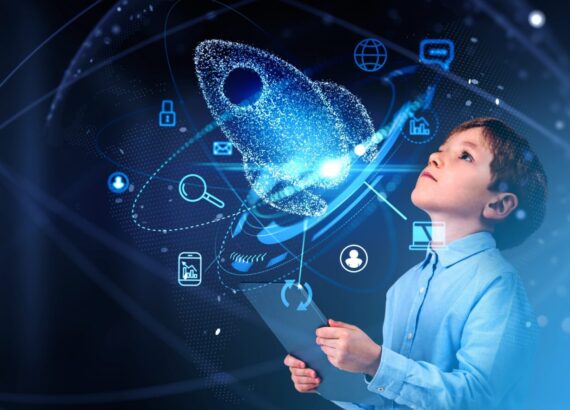The Future of Customer Service: How ChatGPT is Revolutionizing the Business
In today’s rapidly evolving digital landscape, customer service has become a critical differentiator for businesses seeking to stand out in a crowded marketplace. With the advent of artificial intelligence (AI) technology, customer interactions have undergone a significant transformation. One of the most promising advancements in this field is ChatGPT, an AI-powered chatbot that is revolutionizing the customer service industry. By leveraging the power of natural language processing and machine learning, ChatGPT is reshaping the way businesses engage with their customers, enhancing satisfaction and efficiency.
In this article, we will delve into the various aspects of ChatGPT’s role in customer service, exploring its impact on customer interactions, the challenges in implementation, its potential for personalized support, prospects, and ethical considerations in maintaining a human touch in AI-driven interactions. Join us as we unravel the exciting future of customer service with ChatGPT at the forefront.
1. Introduction to ChatGPT and its role in customer service
1.1 What is ChatGPT?
It has been trained on a vast amount of data from the internet and is capable of understanding and responding to a wide range of user queries.
1.2 The evolution of customer service
Customer service has come a long way from the days of long phone queues and scripted interactions. With the rise of technology, companies have been able to explore new avenues to enhance customer support. From email to live chat, businesses have been adapting to meet the growing expectations of customers.
1.3 ChatGPT’s role in transforming customer service
ChatGPT is revolutionizing the customer service industry by offering intelligent and efficient chatbot solutions. It can provide instant responses to customer queries, reducing wait times and improving overall satisfaction. By leveraging natural language processing capabilities, ChatGPT can understand and respond to complex customer inquiries, making interactions feel more personalized and human-like.
2. Enhancing customer interactions with AI-powered chatbots
2.1 The rise of AI-powered chatbots
AI-powered chatbots have gained popularity in recent years, allowing businesses to automate customer interactions. These chatbots use artificial intelligence algorithms to simulate human conversation and provide quick and accurate responses to customer queries.
2.2 Benefits of using AI-powered chatbots for customer interactions
AI-powered chatbots offer numerous benefits for customer interactions. They are available 24/7, ensuring round-the-clock support. Chatbots also can handle multiple conversations simultaneously, reducing wait times for customers. Additionally, they can quickly access and provide information from databases, making interactions more efficient.
2.3 How ChatGPT improves customer interactions
ChatGPT takes customer interactions to the next level by providing more sophisticated and natural responses. Its advanced language understanding capabilities allow for a more engaging and personalized conversation. ChatGPT can learn from previous interactions, enabling it to provide tailored and contextually relevant responses, leading to a better customer experience.
3. ChatGPT’s impact on customer satisfaction and engagement
3.1 Improving Customer satisfaction through personalized Responses
ChatGPT’s ability to generate personalized responses based on user inputs significantly enhances customer satisfaction. Customers feel heard and understood when interacting with a chatbot that can provide relevant and customized answers, leading to a positive experience and increased customer loyalty.
3.2 Enhancing engagement with intelligent conversation flows
By leveraging intelligent conversation flows, ChatGPT keeps customers engaged throughout the interaction. It can ask follow-up questions, clarify ambiguities, and maintain a smooth conversation flow for a more natural and interactive experience. This increased engagement improves the overall quality of customer interactions.
3.3 Case studies on increased customer satisfaction and engagement with ChatGPT
Multiple case studies have demonstrated the positive impact of ChatGPT on customer satisfaction and engagement. Companies utilizing ChatGPT have reported higher customer satisfaction scores, reduced response times, and improved resolution rates. These success stories highlight the effectiveness of ChatGPT in transforming customer service.
4. Overcoming challenges in implementing AI-driven customer service solutions
4.1 Data privacy and security concerns
Implementing AI-driven customer service solutions requires careful consideration of data privacy and security concerns. Companies must ensure proper data protection measures are in place to safeguard customer information and comply with relevant regulations. Transparency in data handling practices is crucial to building trust with customers.
4.2 Dealing with biases and ethical considerations
As with any AI technology, biases can be a concern in AI-driven customer service solutions. It is essential to train AI models like ChatGPT with diverse and unbiased data to avoid perpetuating discriminatory or harmful behaviours. Regular monitoring and auditing of the chatbot’s responses can help address any potential ethical concerns.
4.3 Ensuring seamless integration and user experience
Integrating AI-driven customer service solutions seamlessly into existing systems and platforms is essential for a smooth user experience. Companies need to focus on creating a cohesive customer journey where chatbots seamlessly hand off to human agents when necessary. User feedback and continuous improvement are crucial in refining the integration and delivering a user-friendly experience that surpasses customer expectations a personalized customer experience
5. Leveraging ChatGPT for personalized and efficient customer support
5.1 Delivering personalized support through ChatGPT
With the help of ChatGPT, businesses can deliver personalized customer support on a whole new level. By analyzing customer queries and preferences, ChatGPT can generate responses that are tailored to each individual’s needs. Whether it’s recommending products based on past purchases or providing troubleshooting assistance specific to a customer’s device, ChatGPT ensures a more personalized and relevant support experience.
5.2 Automating repetitive tasks and improving efficiency
One of the biggest advantages of ChatGPT is its ability to automate repetitive tasks in customer service. Mundane inquiries like order status updates or password resets can be handled by ChatGPT, freeing up human agents to focus on more complex and value-added interactions. This automation not only improves efficiency but also reduces wait times for customers, leading to a smoother support process.
5.3 Integrating ChatGPT with human agents for seamless support
While ChatGPT excels at handling routine queries, its true potential is realized when integrated with human agents. By working together, ChatGPT and human agents can provide seamless support that combines the efficiency of automation with the empathy and problem-solving skills of humans. This hybrid approach ensures that customers receive the best of both worlds, creating a support experience that is efficient, personalized, and human-centric.
6. prospects: Advancements and potential applications of ChatGPT in customer service
6.1 Continuous learning and improving ChatGPT’s capabilities
The future of ChatGPT in customer service lies in continuous learning and improvement. By feeding ChatGPT with vast amounts of customer interactions and feedback, it can continuously expand its knowledge base and enhance its ability to understand and respond to customer queries. This ongoing development will result in even more accurate and helpful support, positioning ChatGPT as an indispensable tool in the customer service industry.
6.2 Expanding ChatGPT’s multilingual and multicultural support
As businesses operate in a global marketplace, the demand for multilingual and multicultural support is increasing. ChatGPT has the potential to bridge language barriers and cater to diverse customer bases. With advancements in natural language processing, future iterations of ChatGPT can seamlessly communicate with customers in their preferred language, making customer service accessible and effective across different cultures and regions.
6.3 Innovations in voice-based customer interactions with ChatGPT
The rise of voice assistants and smart devices presents an exciting opportunity for ChatGPT in customer service. Imagine being able to have a natural and conversational interaction with ChatGPT through voice commands. With advancements in voice recognition technology, customer support can become hands-free and effortless. From answering queries to providing personalized recommendations, voice-based customer interactions with ChatGPT have the potential to revolutionize the way we seek assistance.

7. Ethical considerations and maintaining a human touch in AI-driven customer interactions
7.1 Ensuring transparency and explainability of AI-driven interactions
As AI becomes more prominent in customer service, it’s crucial to ensure transparency and explainability in AI-driven interactions. Customers should be aware when they are interacting with ChatGPT and understand the limitations of AI systems. Providing clear notifications and options for human intervention will help customers make informed decisions and maintain trust in the support process.
7.2 Balancing automation and human intervention for a personalized customer experience
While automation brings efficiency, it’s essential to strike a balance between automation and human intervention to maintain a personalized customer experience. Certain situations may require human empathy and intuition that AI systems still struggle to replicate. By identifying the right scenarios for human involvement and enabling seamless transitions between ChatGPT and human agents, businesses can ensure that customers receive the level of service they expect.
7.3 Preserving empathy and emotional intelligence in AI-powered interactions
Empathy and emotional intelligence are crucial aspects of customer support that can make or break a customer’s experience. As AI-driven interactions become more widespread, it’s important to preserve these human qualities. Training ChatGPT to understand and respond empathetically to customer emotions can help create more meaningful and satisfying interactions. By infusing AI with emotional intelligence, businesses can ensure that their customer service remains compassionate and supportive.
8. Embracing the future: How businesses can adopt and optimize ChatGPT for customer service
8.1 Implementing ChatGPT into existing customer service workflows
Integrating ChatGPT into existing customer service workflows requires a thoughtful approach. Businesses should identify the most suitable touchpoints where ChatGPT can add value and streamline operations. Whether it’s through chat interfaces or voice-based solutions, implementing ChatGPT should be done with careful consideration for optimal customer satisfaction and operational efficiency.
8.2 Ongoing training and fine-tuning for optimal performance
To maximize the benefits of ChatGPT, businesses must invest in ongoing training and fine-tuning. Regularly updating and expanding ChatGPT’s knowledge base, analyzing customer interactions, and incorporating feedback is essential for its optimal performance. This iterative process ensures that ChatGPT stays up-to-date, accurate, and capable of meeting evolving customer needs.
8.3 Gathering feedback and iterating to enhance customer satisfaction
Customer feedback is invaluable in enhancing ChatGPT’s performance and improving overall customer satisfaction. Actively seeking feedback through surveys, customer interviews, or sentiment analysis tools can provide valuable insights into areas that require improvement. By incorporating customer feedback into the development process, businesses can iterate and refine ChatGPT to deliver a more satisfying and effective customer support experience.
Conclusion
As we conclude our exploration of the future of customer service with ChatGPT, it is clear that we are witnessing a paradigm shift in how businesses interact with their customers. The potential of AI-powered chatbots like ChatGPT to enhance customer satisfaction, streamline support processes, and open up new possibilities for personalized interactions is truly remarkable.
However, it is crucial to remember that while technology can augment and optimize customer service, maintaining a human touch and addressing ethical considerations will always be essential. By embracing the advancements and addressing the challenges, businesses can leverage the power of ChatGPT and shape the future of customer service in a way that benefits both customers and businesses alike.
FAQ
Q1: What is ChatGPT?
ChatGPT is an AI-powered chatbot that utilizes natural language processing and machine learning techniques to engage in human-like conversations with customers. It is designed to assist businesses in providing efficient and personalized customer service interactions.
Q2: How does ChatGPT enhance customer interactions?
ChatGPT enhances customer interactions by providing timely and accurate responses to customer queries and concerns. It can handle a wide range of customer inquiries, automate repetitive tasks, and deliver personalized support, resulting in improved customer satisfaction and engagement.
Q3: Can ChatGPT replace human customer service agents entirely?
While ChatGPT can handle many customer interactions effectively, it is not designed to replace human customer service agents entirely. Human touch and empathy are still crucial in certain scenarios that require complex problem-solving, emotional support, or delicate situations. Integrating ChatGPT with human agents can create a powerful synergy and ensure a seamless customer experience.
Q4: How can businesses address ethical considerations in AI-driven customer interactions?
To address ethical considerations, businesses should ensure transparency in communicating with customers that they are interacting with an AI-powered chatbot. They should also focus on preventing biases in the AI model, protecting customer data privacy, and providing options for human intervention when necessary. By prioritizing ethical guidelines, businesses can maintain trust and build long-lasting customer relationships.
Thank you for reading 🙂
If you want to build your website at an affordable price contact: www.nextr.in
Read this: How To Become A Web Developer?


















